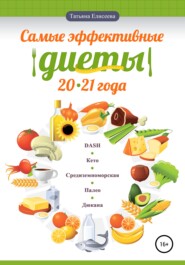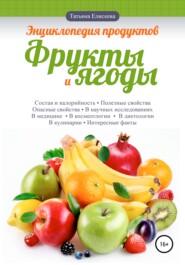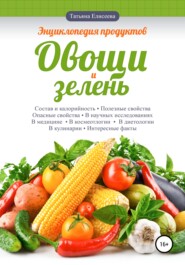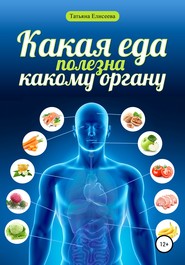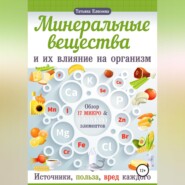По всем вопросам обращайтесь на: info@litportal.ru
(©) 2003-2025.
✖
Минеральные вещества и их влияние на организм человека
Настройки чтения
Размер шрифта
Высота строк
Поля
• ингибиторы протонной помпы для лечения желудочного рефлюкса – ранитидин, омепразол, нольпаза и др.; [37]
• ингибиторы ангиотензинпревращающего фермента (АПФ) при высоком кровяном давлении;
• секвестранты желчных кислот для снижения холестерина – колестипол, холестирамин.
Добавки железа в свою очередь снижают биодоступность леводопа, который назначают для лечения синдрома беспокойных ног, болезни Паркинсона. Они также ухудшают усвоение левотироксина – препарата для лечения плохо функционирующей щитовидной железы. [38]
Комментарий эксперта
Татьяна Елисеева, диетолог, нутрициолог
Желательно получать суточную норму железа из полезной пищи, а не из добавок. У здоровой диеты нет риска передозировки, и она наполняет организм другими питательными веществами. Также желательно не пить чай после еды, готовить пищу в чугунной посуде, есть одновременно продукты с большим содержанием железа и витамина С. Если изменения в рационе не улучшают показатели, тогда стоит поговорить с врачом, диетологом или нутрициологом о приеме добавок.
Подводя итог, можно сказать, что дефицит железа – одна из наиболее распространенных проблем с питанием в мире. Его усвоение зависит от того, сколько вещества накапливает организм. Это веский повод следить за уровнем ферритина и стремится предупреждать проблему, а не бороться с последствиями.
Источникиинформации
1. Metabolism of iron stores, https://www.ncbi.nlm.nih.gov/pmc/articles/PMC4345694/
2. Iron, https://www.hsph.harvard.edu/nutritionsource/iron/
3. Iron bioavailability and dietary reference values, https://pubmed.ncbi.nlm.nih.gov/20200263/
4. Iron, Fe (mg), https://fdc.nal.usda.gov/fdc-app.html#/?component=1089
5. Iron, https://ods.od.nih.gov/factsheets/Iron-HealthProfessional/
6. Iron ingestion: an evidence-based consensus guideline for out-of-hospital management, https://pubmed.ncbi.nlm.nih.gov/16255338/
7. Iron and the female athlete: a review of dietary treatment methods for improving iron status and exercise performance, https://www.ncbi.nlm.nih.gov/pmc/articles/PMC4596414/
8. Higher Prevalence of Iron Deficiency as Strong Predictor of Attention Deficit Hyperactivity Disorder in Children, https://www.ncbi.nlm.nih.gov/pmc/articles/PMC4212392/
9. Review on iron and its importance for human health, https://pubmed.ncbi.nlm.nih.gov/24778671/
10. Prediction of dietary iron absorption: an algorithm for calculating absorption and bioavailability of dietary iron, https://pubmed.ncbi.nlm.nih.gov/10799377/
11. Mechanisms of heme iron absorption: Current questions and controversies, https://www.ncbi.nlm.nih.gov/pmc/articles/PMC2725368/
12. The absorption of iron from whole diets: a systematic review, https://pubmed.ncbi.nlm.nih.gov/23719560/
13. Vitamin A and beta-carotene can improve nonheme iron absorption from rice, wheat and corn by humans, https://pubmed.ncbi.nlm.nih.gov/9482776/
14. Calcium and iron absorption–mechanisms and public health relevance, https://pubmed.ncbi.nlm.nih.gov/21462112/
15. Calcium: effect of different amounts on nonheme- and heme-iron absorption in humans, https://pubmed.ncbi.nlm.nih.gov/1984335/
16. Meat protein fractions enhance nonheme iron absorption in humans, https://pubmed.ncbi.nlm.nih.gov/17056805/
17. Effect of tea and other dietary factors on iron absorption, https://pubmed.ncbi.nlm.nih.gov/11029010/
18. Effects of cooking methods on the iron and zinc contents in cowpea (Vigna unguiculata) to combat nutritional deficiencies in Brazil, https://www.ncbi.nlm.nih.gov/pmc/articles/PMC3926463/
19. Ferrous versus Ferric Oral Iron Formulations for the Treatment of Iron Deficiency: A Clinical Overview, https://www.ncbi.nlm.nih.gov/pmc/articles/PMC3354642/
20. Questions and answers on iron deficiency treatment selection and the use of intravenous iron in routine clinical practice, https://www.ncbi.nlm.nih.gov/pmc/articles/PMC7877947/
21. Iron Deficiency Anemia in Inflammatory Bowel Diseases-A Narrative Review, https://pubmed.ncbi.nlm.nih.gov/34836263/
22. Ferrous Sulfate Supplementation Causes Significant Gastrointestinal Side-Effects in Adults: A Systematic Review and Meta-Analysis, https://www.ncbi.nlm.nih.gov/pmc/articles/PMC4336293/
23. Serum Trace Element Levels and Their Correlation with Picky Eating Behavior, Development, and Physical Activity in Early Childhood, https://www.ncbi.nlm.nih.gov/pmc/articles/PMC8308333/
24. Position of the American Dietetic Association: vegetarian diets, https://pubmed.ncbi.nlm.nih.gov/19562864/
25. EPIC-Oxford: lifestyle characteristics and nutrient intakes in a cohort of 33 883 meat-eaters and 31 546 non meat-eaters in the UK, https://pubmed.ncbi.nlm.nih.gov/12740075/
26. Bioavailability of iron, zinc, and other trace minerals from vegetarian diets, https://pubmed.ncbi.nlm.nih.gov/12936958/
27. Iron deficiency and cognitive functions, https://www.ncbi.nlm.nih.gov/pmc/articles/PMC4235202/
28. Effects of iron deficiency anemia on cognitive function in children, https://pubmed.ncbi.nlm.nih.gov/17691592/
29. Iron overload in human disease, https://pubmed.ncbi.nlm.nih.gov/22276824/
30. Beyond hereditary hemochromatosis: new insights into the relationship between iron overload and chronic liver diseases, https://pubmed.ncbi.nlm.nih.gov/20739232/
31. Iron overload: consequences, assessment, and monitoring, https://pubmed.ncbi.nlm.nih.gov/20001632/
32. Hepatic Iron Overload and Hepatocellular Carcinoma, https://www.ncbi.nlm.nih.gov/pmc/articles/PMC3995380/
33. Circulating ferritin concentrations and risk of type 2 diabetes in Japanese individuals, https://www.ncbi.nlm.nih.gov/pmc/articles/PMC5497053/
34. Iron Plays a Certain Role in Patterned Hair Loss, https://www.ncbi.nlm.nih.gov/pmc/articles/PMC3678013/
35. Iron Overload, https://www.ncbi.nlm.nih.gov/books/NBK526131/
36. Fatal overdose of iron tablets in adults, https://www.ncbi.nlm.nih.gov/pmc/articles/PMC3841496/
37. Iron Deficiency Anemia Due to the Long-term Use of a Proton Pump Inhibitor, https://www.ncbi.nlm.nih.gov/pmc/articles/PMC5891535/
38. Sinemet-ferrous sulphate interaction in patients with Parkinson's disease, https://www.ncbi.nlm.nih.gov/pmc/articles/PMC1368251/
Йод (I)
Йод – микронутриент, который входит в состав гормонов щитовидной железы. От него зависит иммунитет, работа нервной системы, развитие маленьких детей, поскольку он участвует в формировании костей и мозга. Минерала не нужно так много, как кальция или магния, из-за чего многие недооценивают его значение.
Йод в организме: роль для мужчин, женщин, детей и беременных






